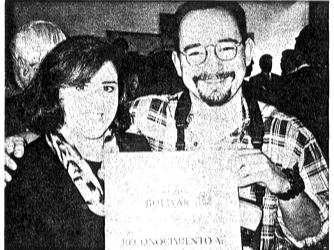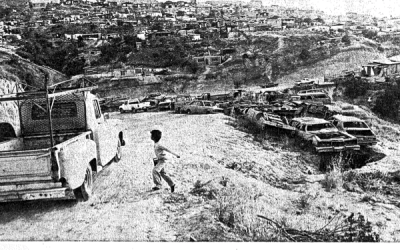Environmental Ethics and Latin America
Moral Resources for Reflection on Public Policy
Environmental issues have become a central focus of public policy in the United States and around the world.The countries of Latin America know from experience that environmental problems are both compelling and complex. Furthermore, because of their history of colonial subjugation and their subsequent economic engagement with North America, these countries understand — perhaps more readily than any other region in the world — that their declining environmental conditions are intimately linked to economic and political policies pursued elsewhere by dominant foreign powers.
Perhaps, most importantly, Latin American countries recognize the ethical and moral implications of current public policy. Because they are the ones who are directly affected, they can pose the ethical questions most starkly. Who, for example, should bear the responsibility for widespread deforestation in some tropical areas? Is it the campasinos hired as day labor with chain saws who actually cut the trees? Is it the multinational beef production companies who employ the campesinos to clear the land to graze cattle for export to North American fast food chains? Is it the North American consumer who has become accustomed to seemingly cheap and convenient take out food? Or is it those who formulate import-export and trade policy that make it both possible and profitable to degrade foreign ecosystems for domestic profit? These are not just abstract or theoretical questions. They are instead issues of great moment and concern for anyone from Latin America, and North Americans have much to learn from our Latin neighbors about the ethical dimensions of public policy.
Harvard’s interfaculty Working Group on Environmental Justice is a new interdisciplinary and university-wide effort to examine issues of environmental justice both within this country and around the world, with joint support from the university Provost’s Fund for Interfaculty Collaboration and the University Committee on Environment. The Law School, the Kennedy School, the School of Public Health, the Divinity School, the Business School, the School of Education and various departments within the Faculty of Arts and Sciences all contain people and resources devoted to exploring diverse problems of environmental justice. We want to bring together faculty members from these schools and departments monthly to share their understandings and perspectives on these matters. These exchanges help to assess what Harvard’s various departments, faculties and schools might contribute to analyzing and resolving problems in this important new area of public concern and policy consideration.
The Working Group also intends to develop and maintain a university-wide computer web-site to post Research Bibliographies, Papers In Progress, an Environmental Justice Document Archive and an Issue Update and Audio Archive series, featuring news reports on problems in environmental justice. As this web-site evolves, it will provide participating faculty and their graduate students with an established infrastructure to carry out collaborative work and personal research.
Finally, the Working Group plans to to organize a significant conference on Environmental Justice at Harvard in the coming months. We hope to assure the full participation of relevant Harvard faculty as well as key national and international figures in this important new area of environmental research and activism.
The Working Group is an offshoot of the Environmental Ethics and Public Policy Program, a core project of the Center for the Study of Values in Public Life at the Harvard Divinity School. As part of the effort to educate people who will undertake professional work in positions of public responsibility in churches, denominational organizations, social agencies, educational institutions and civic organizations, the Environmental Ethics and Public Policy Program trains students to conduct their own ongoing research on the ethical implications of important environmental issues.
As part of the Center for the Study of Values in Public Life, the Harvard Seminars on Environmental Values serve as a major means of outreach for the University Committee on Environment. People from outside academe are invited to attend the seminars and receive mailings to create real-life discussions with people on the ‘front lines.’ This outreach is enhanced by the publication of the Center’s efforts on the web.
The Harvard Seminar on Environmental Values is focusing this year on: “Air– Breath of Life, Winds of Changes: Toward a New Environmental Ethic”. New kinds of awareness imply new forms of ethical obligation, and we will be examining these connections throughout the year as we consider topics like air-borne contamination, acid rain, “pollution permits,” the spread of air-borne diseases, aerosol carcinogens and second-hand smoke, indoor toxic environments, global atmospheric and climatic change and many other subjects that highlight the need for humankind to devise a new environmental ethic toward air.
Devising effective public policy on environmental matters requires a reassessment of deeply held cultural values. The sustained renewal of values in any realm of environmental concern stems ultimately from a fresh encounter with the fundamental conditions of human existence in the ecosystem. This year’s Seminar topic makes this reflection possible, and it provides scientists, humanists, policy analysts, business people, government officials, and environmentalists a timely forum for deliberation on the important new task of developing an environmental ethic for air.
THE WEB AND ENVIRONMENTAL JUSTICE
Interfaculty Working Group on Environmental Justice <http://divweb.harvard.edu/csvpl/ee/EcoJustice/>
The Environmental Ethics and Public Policy Program of the Center for the Study of Values in Public Life (CSVPL) “Occasional Papers Series” <http://divweb.harvard.edu/csvpl/ee/ops-00.htm>
Harvard Seminar on Environmental Values <http://divweb.harvard.edu/csvpl/ee/hsev/>
Subject Bibliographies in Environment Ethics <http://divweb.harvard.edu/csvpl/ee/bib/>
‘Short Title Subject Lists’ of general environmental topics <http://divweb.harvard.edu/csvpl/ee/bib/titles.htm>
Fall 1998
Timothy Weiskel is the director of the Harvard Seminars on Environmental Values, Environmental Ethics and Public Policy Program, Harvard Divinity School.
Related Articles
Caballero wins Colombia’s top journalism prize
Building on work she started at the David Rockefeller Center for Latin American Studies, investigative journalist Maria Cristina Caballero has won Colombia’s top journalism prize…
Between Vengeance and Forgiveness
At the close of this century of death camps, killings fields and desaparecidos, there is perhaps no more urgent question than the one raised in Martha Minow’s useful new book: Can societies…
The Environment in Latin America
This issue of the DRCLAS NEWS deals with some of the environmental problems of Latin America, one of the priorities of the David Rockefeller Center for Latin American Studies…




